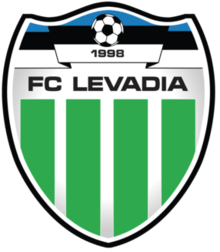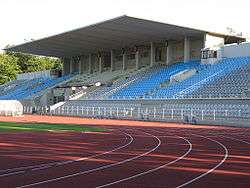FC Levadia Tallinn
 | |||
| Full name | Football Club Levadia Tallinn | ||
|---|---|---|---|
| Founded | 22 October 1998 | ||
| Ground | Kadriorg Stadium | ||
| Capacity | 5,000[1] | ||
| President | Viktor Levada | ||
| Manager | Igor Prins | ||
| League | Meistriliiga | ||
| 2016 | Meistriliiga, 2nd | ||
| Website | Club home page | ||
|
| |||
FC Levadia Tallinn, commonly known as Levadia Tallinn, or simply as Levadia, is a professional football club, based in Tallinn, Estonia.
Founded in 1998, the club has played in the Meistriliiga since 1999 and have never been relegated from the Estonian top division. Levadia has won 9 Meistriliiga, 8 Estonian Cup and 5 Estonian Supercup trophies.
History
Early history
Levadia was founded on 22 October 1998, when metal manufacturing company OÜ Levadia became the official sponsor of Maardu based Esiliiga club Olümp, subsequently renamed Levadia. The club won the 1998 Esiliiga season and was promoted to Meistriliiga. Before the next season, the club merged with Meistriliiga club Tallinna Sadam and hired Sergei Ratnikov as a manager.
Levadia had tremendously successful start, winning the 1999 Meistriliiga, the 1998–99 Estonian Cup and the 1999 Estonian Supercup. Toomas Krõm won the goal scoring title with 19 goals in Meistriliiga. The club managed to defend the Meistriliiga title in the next 2000 season, along with winning another Estonian Cup and Estonian Supercup trophy. In the 2000–01 UEFA Champions League, Levadia defeated Total Network Solutions 2–6 on aggregate in the first qualifying round but lost to Shakhtar Donetsk 2–9 on aggregate in the second qualifying round. Following the loss to Shakhtar Donetsk, Ratnikov was sacked.
In January 2001, Valeri Bondarenko was appointed as a manager. Bondarenko began the season by winning the Estonian Supercup but failed to defend the Meistriliiga title, finishing the season in third place behind the winners Flora and runners-up TVMK. In 2002, Pasi Rautiainen took over as a manager. Under Rautiainen, Levadia finished the 2002 Meistriliiga season second, just two points behind Flora. After the season, Rautiainen left the club and returned to Finland for personal reasons and was replaced by Franco Pancheri. Pancheri coached Levadia for just 9 Meistriliiga matches, before he was sacked due being unable to maintain the level achieved with Rautiainen. In June 2003, Levadia hired former Estonia national football team manager Tarmo Rüütli and finished the season in third place.
Relocation to Tallinn
In 2004, Levadia moved to Tallinn, while the previously Tallinn-based reserve team with the same name changed its name to Levadia II. Under Rüütli, Levadia won the 2004 Meistriliiga season but failed to defend the title in 2005, coming second behind TVMK. Levadia defeated both Haka and Twente 2–1 on aggregate in the 2006–07 UEFA Cup qualifying rounds but lost to Newcastle United 1–3 on aggregate in the first round. Levadia won two more Meistriliiga titles in 2006 and 2007. In 2008, Rüütli left Levadia, having been hired by the Estonian Football Association to coach the Estonia national football team and was replaced by the previous assistant manager Igor Prins.[2]
Under Prins, Levadia won two consecutive Meistriliiga titles in 2008 and 2009 and an Estonian Cup in 2010. In August 2010, Prins was sacked due to disagreements with the club's board and replaced by Levadia II manager Aleksandr Pushtov.[3] Levadia finished the 2010 season second behind Flora. During the 2010–11 winter transfer window, Levadia lost several key players, including Estonian international players Tarmo Neemelo, Eino Puri and Vladimir Voskoboinikov. In July 2011, Pushtov was sacked after disappointing results in the Meistriliiga and the Champions League and replaced by Sergei Hohlov-Simson. Levadia finished the 2011 season in fourth place, lowest since the club was promoted to the Meistriliiga.
Recent history
In January 2012, Marko Kristal was hired as a manager. Levadia won the 2011–12 Estonian Cup and finished the 2012 Meistriliiga season in second place behind Nõmme Kalju. Under Kristal, Levadia won the Meistriliiga title in 2013 and defended the title in 2014, while Igor Subbotin scored club record 32 goals. Levadia failed to defend the title in the 2015 season, finishing in second place. After the season, it was announced that Sergei Ratnikov will return to Levadia after 15 years and replace Kristal as a manager. Ratnikov's second tenure as Levadia's manager lasted until 11 July 2016, when he was sacked after a 0–1 loss to Pärnu Linnameeskond in the Meistriliiga. He was replaced by another returning manager, Igor Prins.[4] Levadia finished the 2016 season as runners-up, behind the first-time champions Infonet.
Honours
Domestic
- Winners (9): 1999, 2000, 2004, 2006, 2007, 2008, 2009, 2013, 2014
- Runners-up (6): 2002, 2005, 2010, 2012, 2015, 2016
- Third place (2): 2001, 2003
- Winners (1): 1998
- Winners (8): 1998–99, 1999–2000, 2003–04, 2004–05, 2006–07, 2009–10, 2011–12, 2013–14
- Runners-up (1): 2001–02
- Winners (6): 1999, 2000, 2001, 2010, 2013, 2015
- Runners-up (7): 2004, 2005, 2007, 2008, 2009, 2011, 2014
Regional
- Runners-up (2): 2005, 2008
Stadium
Kadriorg Stadium

The club's home ground is the 5,000-seat Kadriorg Stadium. Built from 1922–1926 and opened on 13 June 1926, it is one of the oldest football stadiums in Estonia. Kadriorg Stadium used to be the home ground of the Estonia national football team until the completion of the A. Le Coq Arena in 2001.[5][6]
The stadium is located in Kadriorg, at Roheline aas street 24, Tallinn.
Levadia uses Sportland Arena and Maarjamäe Stadium artificial turfs during winter and early spring months for training and home matches.
Players
First-team squad
As of 23 July 2016.[7] Note: Flags indicate national team as defined under FIFA eligibility rules. Players may hold more than one non-FIFA nationality.
|
|
Out on loan
Note: Flags indicate national team as defined under FIFA eligibility rules. Players may hold more than one non-FIFA nationality.
|
|
Reserves and academy
Personnel
Current technical staff
|
Managerial history
|
Statistics
League and Cup

| Season | Division | Pos | Pld | W | D | L | GF | GA | GD | Pts | Top goalscorer | Cup | Supercup |
|---|---|---|---|---|---|---|---|---|---|---|---|---|---|
| 1998 | Esiliiga | 1 | 14 | 9 | 5 | 0 | 29 | 7 | +22 | 32 | |||
| 1999 | Meistriliiga | 1 | 28 | 23 | 4 | 1 | 77 | 12 | +65 | 73 | Winner | Winner | |
| 2000 | Meistriliiga | 1 | 28 | 23 | 5 | 0 | 88 | 20 | +68 | 74 | Winner | Winner | |
| 2001 | Meistriliiga | 3 | 28 | 15 | 7 | 5 | 72 | 35 | +37 | 55 | Semifinalist | Winner | |
| 2002 | Meistriliiga | 2 | 28 | 20 | 8 | 2 | 79 | 25 | +54 | 62 | Finalist | Finalist | |
| 2003 | Meistriliiga | 3 | 28 | 15 | 4 | 9 | 54 | 30 | +24 | 49 | Semifinalist | ||
| 2004 | Meistriliiga | 1 | 28 | 21 | 6 | 1 | 82 | 14 | +68 | 69 | Winner | Finalist | |
| 2005 | Meistriliiga | 2 | 36 | 28 | 5 | 3 | 97 | 25 | +72 | 89 | Winner | Finalist | |
| 2006 | Meistriliiga | 1 | 36 | 30 | 4 | 2 | 114 | 29 | +85 | 94 | Second round | ||
| 2007 | Meistriliiga | 1 | 36 | 29 | 4 | 3 | 126 | 20 | +106 | 91 | Winner | Finalist | |
| 2008 | Meistriliiga | 1 | 36 | 29 | 6 | 1 | 105 | 22 | +83 | 93 | Semifinalist | Finalist | |
| 2009 | Meistriliiga | 1 | 36 | 31 | 4 | 1 | 121 | 23 | +98 | 97 | Quarterfinalist | Finalist | |
| 2010 | Meistriliiga | 2 | 36 | 26 | 8 | 2 | 100 | 16 | +84 | 86 | Winner | Winner | |
| 2011 | Meistriliiga | 4 | 36 | 21 | 10 | 5 | 76 | 25 | +51 | 73 | Second round | Finalist | |
| 2012 | Meistriliiga | 2 | 36 | 25 | 8 | 3 | 85 | 22 | +63 | 83 | Winner | ||
| 2013 | Meistriliiga | 1 | 36 | 30 | 1 | 5 | 69 | 24 | +45 | 91 | Fourth round | Winner | |
| 2014 | Meistriliiga | 1 | 36 | 26 | 6 | 4 | 112 | 19 | +93 | 84 | Winner | Finalist | |
| 2015 | Meistriliiga | 2 | 36 | 22 | 10 | 4 | 78 | 32 | +46 | 76 | Third round | Winner | |
| 2016 | Meistriliiga | 2 | 36 | 24 | 6 | 6 | 77 | 30 | +47 | 78 | Fourth round |
Europe
Player records
As of 5 November 2016.[8] Active players in bold.
Most Meistriliiga games
|
Most Meistriliiga goals
|
References
- ↑ "Kadrioru staadion". fclevadia.ee. Retrieved 16 June 2008.
- ↑ "Tarmo Rüütli kinnitati Eesti koondise peatreeneriks". Postimees. Retrieved 22 November 2007.
- ↑ "Levadia lõpetas peatreener Igor Prinsiga lepingu". Postimees. Retrieved 3 August 2010.
- ↑ "Ratnikov lahkus Levadiast, uus peatreener on Prins" (in Estonian). Soccernet.ee. 11 July 2016.
- ↑ "Kadrioru staadion" (in Estonian). FC Levadia.
- ↑ "Ajalugu". kadriorustaadion.ee. Retrieved 10 July 2008.
- ↑ "Esindusmeeskond". FC Levadia (in Estonian). Retrieved 5 March 2016.
- ↑
External links
- Official website (English) (Estonian) (Russian)
- UEFA